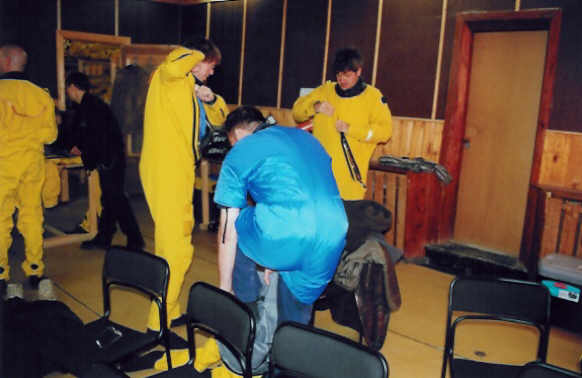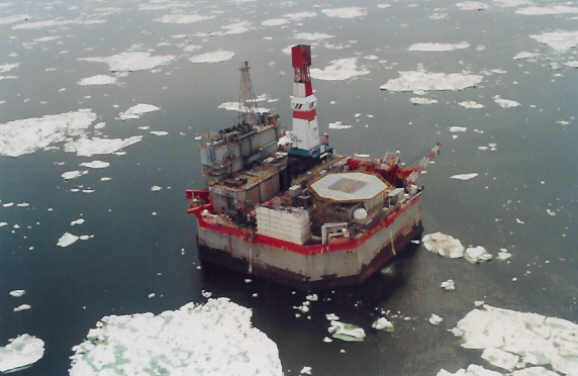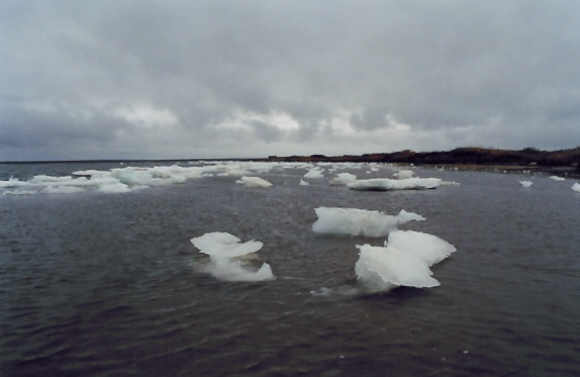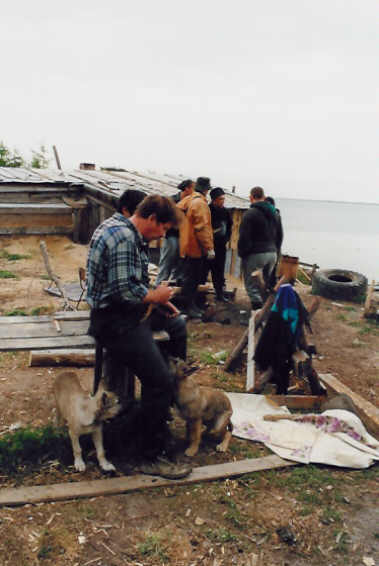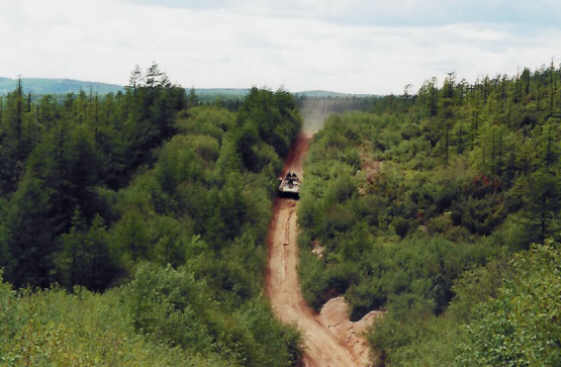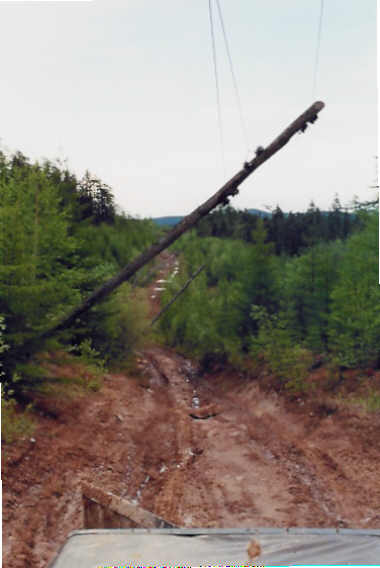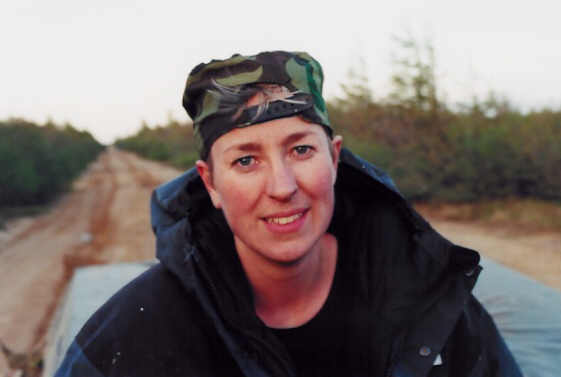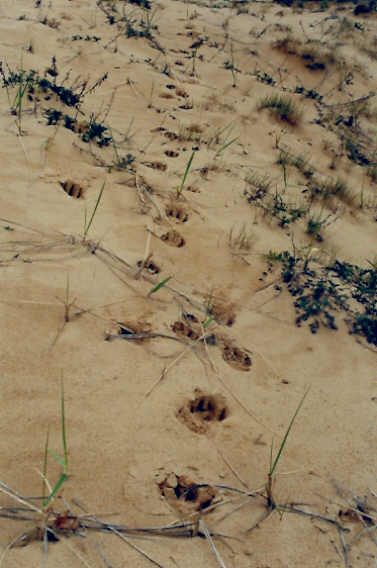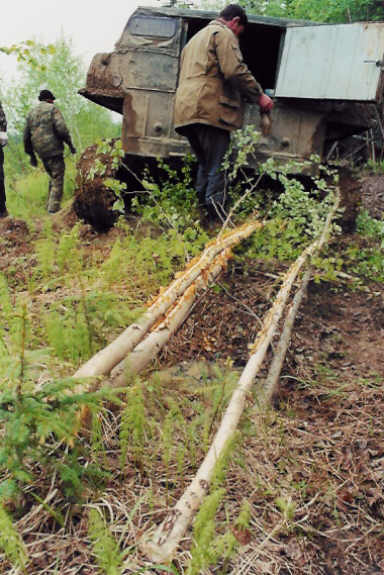Petra's homepage
Experiences of a Dutch Journalist
Trip to North Sakhalin, June 2002
The north east of Sakhalin is not very often visited by foreigners. First of all, it is a 15 hour journey by train. On top of that, conditions are harsh and luxury stops at the only one hotel in the city of Nogliki with a population of 12,000. Only 120 kilometres away, the main village in west Sakhalin, Pogiby, has only 14 inhabitants. One of the reasons nobody goes there, is because there is basically no road. On the (non) way, you meet all kinds of poachers, from the ones that only catch for food, to the ones that make a fortune. I started off with a guided tour around the off shore platform 'Molikpaq'.
In order to be allowed on Shell daughter Sakhalin Energy's helicopter to the oil production platform Molikpaq in the northeast of Sakhalin, we had to lift ourselves in air tight suits. A necessity with a water temperature of 4 degrees maximum (haven't we all seen the movie Titanic??).
When you're aboard the helicopter, the sights are absolutely marvellous. Here the northeastern coast at the beginning of June. Still plenty of ice floes, that look small, but actually can reach a depth of up to 20 metres, making oil production impossible until they are all melted or blown away by the wind.
The Molikpaq here, is the only unit bringing in money, it represents phase 1 of the Sakhalin 2 project. All the people in the fancy offices in Yuzhno-Sakhalinsk are waiting for the 'final investment decision' for the 8.5 billion dollar phase 2 of the Sakhalin-2 project, operated by Shell (Am I getting too technical here???).
From the boat point of view (exploring a bay important for oil and gas development) the ice looks quite different, almost like sculptures.
These men claim to protect the 'Sakhalin Taimen', a type of fish mentioned in the 'Russian Red Book of Endangered Species'. Probably they do prevent other poachers from catching the fish, but at the same time, they are keeping everything to themselves....
Poachers are all over the place on Sakhalin. You don't have to go and find them, they'll find you! Our guide - a professional poacher next to his official job at a sable kolkhoz - advised me not to take any close pictures of the military vehicle we met, as "they don't like it". Our means of transportation was a similar type of vehicle, which the driver had obtained from the military in exchange for 'open debts'.
Before we run into another type of poachers, we had to pass numerous hills and obstacles such as electricity poles dropping as match sticks due to erosion. The local oil company didn't make a proper road along the pipeline. Now, the track is getting wider every year.
Full of mud spots is what you look like after sitting on top of an ex-military vehicle for 8 hours. What you feel like? No sleep for 5 days (insects in the eyes), smoking for 5 years (just sitting next to the exhaust pipe; I gave up smoking 10 months ago, really) and a soar throat that needs plenty of wine. Instead, two shots of vodka for each person were available, as we had to carry everything we needed ourselves. We could stay in a guesthouse attached to the house of one of the 14 inhabitants of Pogiby.
Back to poaching: this is 'Kaluga' or sturgeon, another type of fish mentioned in the 'Russian Red Book of Endangered Species'. The inhabitants of Pogiby catch Kaluga occasionally. Instead of cashing 300 to 400 dollars dollars for a fish at the market, they prefer to keep it to themselves. Or offer it for lunch to visitors (to us too! Not the caviar though).
Beer tracks all over the place in Pogiby, I only didn't get to see any beers! Could it be the enormous noise our vehicle? To be honest: it was almost scaring to see three different fresh tracks in the early morning, pointing in the direction of the place where we had stayed overnight. Apparently, the owner of the place had to scare off the bear(s) in the morning, a daily ritual. Who could tell for sure what he had seen, as he got home as drunk as never before in 28 years, his wife said. So what did they do the next morning? Have two bottles of vodka to accompany the breakfast of cooked potatoes and salads.
No wonder the caterpillar track came off, as our young and wild driver moved from an impossible track to a better track, ending the life of four trees...
Do you want to read the article about this trip? Then follow this link:

